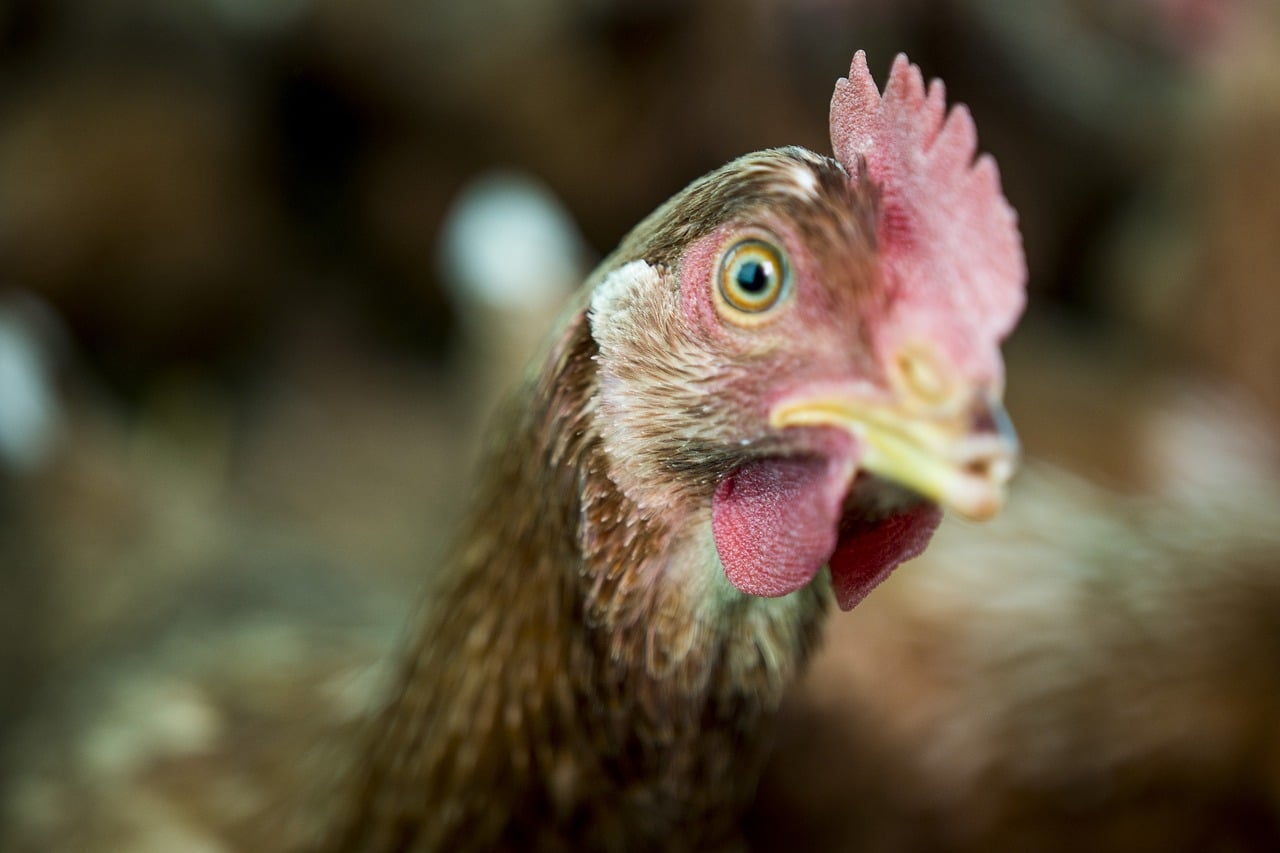If you have chickens, no matter what kind, you’ve likely heard them making all kinds of unique (potentially worrisome!) noises.
I just want to say to start out – there’s usually nothing to worry about. Chickens are capable of producing well over two dozen different sounds and calls, each with a distinct purpose and communicative goal.
You can learn a lot about your chickens by listening to what they have to say. Here are some of the most common chicken sounds – as well as what they mean.
10 Common Chicken Sounds & Noises
Here are 10 of the most common noises and sounds that you’ll hear from your chickens.
Further below in this article we will cover exactly how to recognize these sounds and what they mean for your flock.
- Egg Songs
- Coop Noises
- Broody Growls
- Happy Murmuring
- Predator Alerts
- Parenting and Chick Chatter
- Food Signals
- Roosting Calls
- Mating Invitations
- Distress Calls
1. Egg Songs
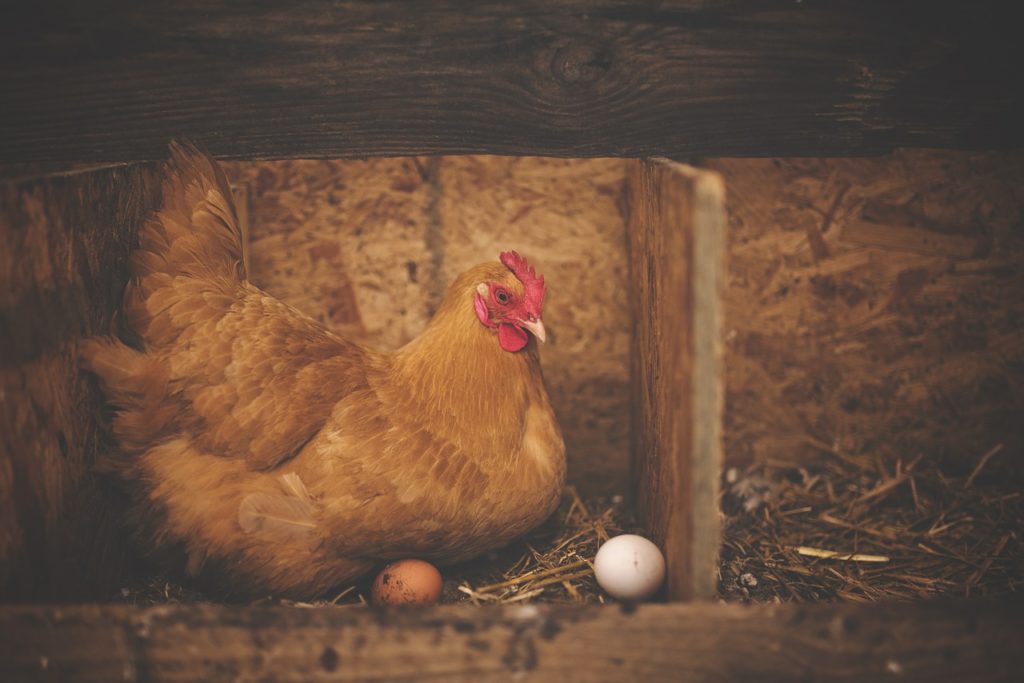
This is perhaps the most common chicken vocalization, and if you have laying hens, one that you are probably quite used to hearing.
When chickens are getting ready to lay an egg – or are in the process of laying an egg – they will make all kinds of noises.
These can take a manner of formats.
You might hear your chickens cackling as they wait for a nest box, or you might hear grumbles of agitation when they find that their favorite nest box is already occupied.
Chickens who are impatiently waiting for a nest box aren’t unlike a line of people waiting to use a restroom – they will get incredibly agitated and start complaining!
The song can change a bit, becoming higher pitched and more frantic if two hens begin to squabble over the same nest box.
Usually, this warbling will cease quickly when a more dominant hen is able to get her own way.
If you notice this behavior often, it might be best to pick up a few additional nesting boxes. Giving your hens a few different options is never a bad idea.
[amazon box=”B005CEQYJK”]
2. Coop Noise
You’re likely to hear your chickens making all kinds of noises first thing in the morning
Of course, your roosters – if you have any – will begin to crow, but did you know that your hens will make noise first thing in the morning, too?
It’s almost as though they are saying good morning to you, and to each other.
You’ll also notice coop chatter when they are settling down for the night.
Morning noise tends to be more rambunctious, while evening chatter will be more subdued.
3. Broody Growls
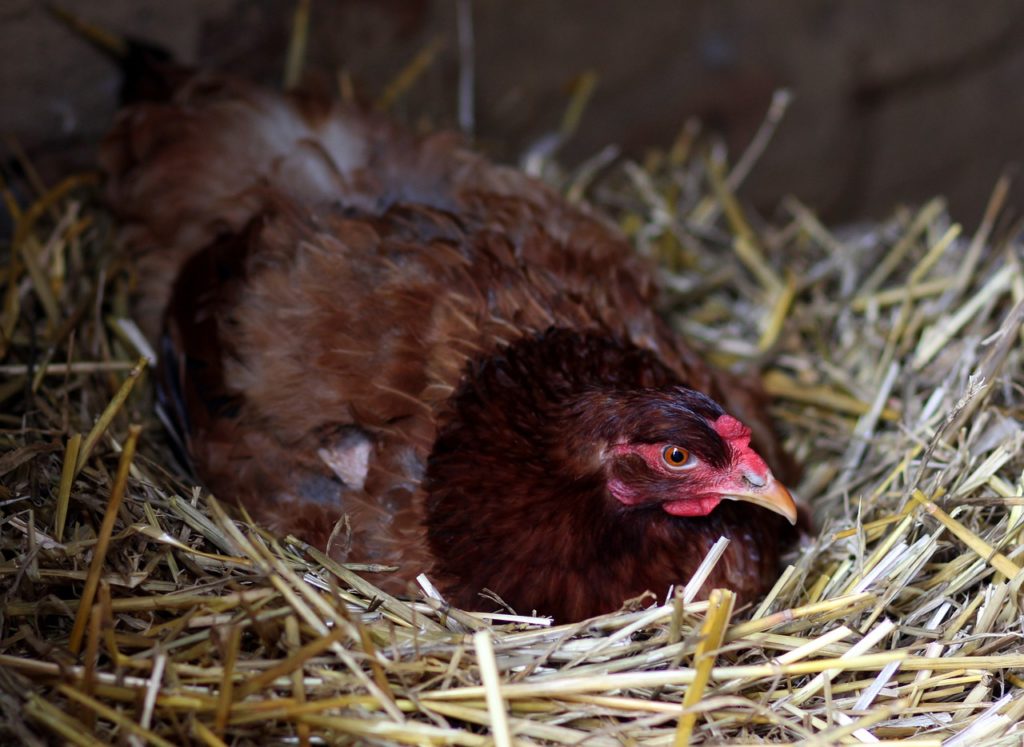
Broody hens, or birds who have laid eggs and are now sitting on them and waiting for them to hatch, will make unmistakable noises.
Usually, she won’t let out one of these grumbles until she feels threatened or agitated.
Have you ever tried to push a broody hen off her eggs, or seen another chicken try to do the same?
Get too close to a broody bird, and she’ll growl at you – just like a dog. This growl is trying to tell you to get away, and get away fast – she is surging with hormones and wants nothing to do with you.
She especially doesn’t want you getting anywhere near her eggs or chicks!
Occasionally, a broody hen will scream more loudly at you, turning her grumble into a full-blown, enraged tantrum. She might also puff up her feathers and peck at you until you leave.
If a broody hen gets off her eggs of her own accord (either to eat or to steal a drink of water) she will likely be miserable.
She is more likely to engage in constant clucking and she will be agitated to those around her.
This is your broody hen’s way of telling everybody to get out of her way so she can get what she needs to accomplish and get back to her eggs.
If you’re feeling generous, it can help if you provide separate food and water for your hen close to her brooding location.
4. Happy Murmuring
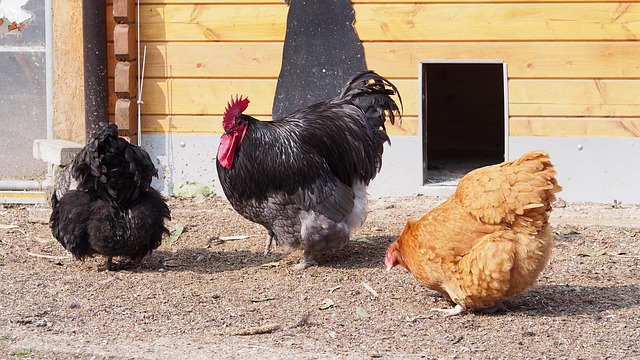
This is the best kind of chicken noise to hear.
You’re likely to hear contented noises from your chickens when they’re hanging out in the yard, foraging, or chilling in the dust bath.
This is one of the easiest ways to identify through your hearing whether your chickens are safe and happy or not. Chickens usually like to remain within earshot of each other while they graze.
As a result, they will let out frequent low murmurs or chatters to make sure they can hear each other.
If they can’t – or if another chicken sounds the alarm call (which we’ll talk about in a moment) – they will take action immediately.
If you domesticate your chickens either for showing purpose or for keeping as pets, you may also recognize this kind of noise from when you groom them or keep them on your lap.
If you pet your chicken, you can tell it is happy because it will make some low, contented noises, too.
5. Predator Alerts
This call is one of the most important for you to know.
A predator call will sound differently between a hen and a rooster, but it will usually be very high, very loud, and very shrill.
While it’s more common for roosters to issue a predator alert call, signaling the rest of the flock to danger, you may hear it from a more dominant hen or even from other members of your flock if you have a small group.
These noises may be singular loud, piercing calls, or they might be elongated bellows.
You might hear a caution call, which sounds like rapidly repeated notes. This doesn’t necessarily mean that your flock is under attack – but rather that something dangerous is amiss and the birds are alerting each other to pay attention.
Another call you might hear is a repeated alarm noise. This sounds like a repeated cackle and is an even stronger sign that a predator is nearby.
The final type of predator call you might hear is one often referred to as the “air raid“ noise.
This is the most alarming noise that you can hear your chickens make, and it is likely one that will send you scrambling out to the chicken coop with whatever weapon you can find!
An air raid sound is a very loud, very identifiable sound.
It’s usually made by a rooster but that does not always have to be the case, particularly if you don’t have a rooster and one hen has made herself the dominant leader of the flock.
This noise signals that the flock is in imminent danger. You might hear this noise if a raccoon has made its way into the run, a hawk is circling overhead, or a possum is lurking nearby.
The bottom line is this: if you hear a noise that sounds panicky and is in any way out of the ordinary, check on your chickens immediately.
There’s a good chance that a predator of some sort is going after your chickens.
6. Parenting and Chick Chatter
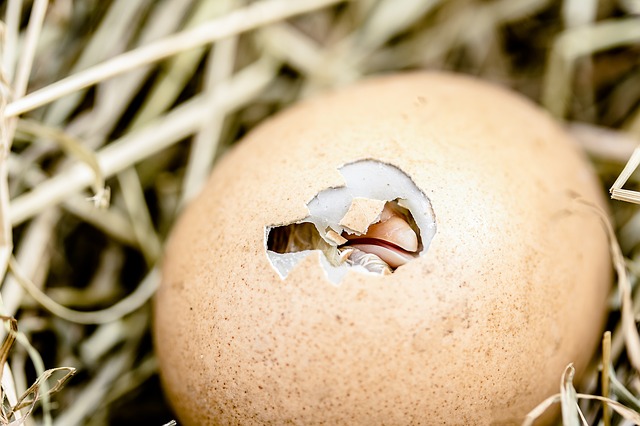
There are two ways a mother hen might talk to her babies: while they are still in the egg, and long after they have hatched.
Here are the differences in how a mother chicken will communicate to her young chicks.
Chicks Still in the Egg
Did you know that mother hens will begin talking to their chicks, even long before they have hatched? Just like a mother talks to her baby while she is pregnant, a mother hen will also chatter to her chick.
This usually sounds like clucking and purring, and it will be done quietly – she doesn’t want to disturb the unhatched chick.
You might notice your hen doing this either while she is still sitting on the eggs or perhaps if she needs to get up and shift the eggs underneath her.
While it’s exact scientific reasons aren’t certain, it’s suspected that a mother hen clucks and purrs to her chicks as her way of acclimating the chick to the sound of her voice.
What’s really fascinating is listening to this sound when the chicks are in their final stages of incubation.
You will be able to hear them peeping back as they talk back to their mothers.
When your hen responds, she is essentially encouraging them to break free of the shell, letting them know that they will be safe once they do so.
Baby Chicks
When your chicks hatch, you can find your hens talking to them then, too. This is partially to acquaint them with the pecking order, but also to teach them.
You will hear her clucking to her chicks as she teaches them certain lessons, like how to eat, drink, and bathe themselves.
There have been studies that examine how a mother hen’s voice changes when she is talking to her chicks.
If she has chicks that are struggling in any way, the hen will actually slow down her rate of chatter so that her chicks can understand what she’s trying to tell them.
Chicks will often release their own versions of warning or distress calls when they are small, too.
Most often, a distress call from a chick is because it is either feeling threatened or lost.
Occasionally, a chick might release a distress call if it is has gotten itself stuck in some sort of situation.
When the mother hen rushes over to check on her chicks in distress, she will either bring them back to her nest or she will emit a soft growling sound if she believes the chick is in danger.
This will indicate to the chicks that they either need to stay exactly where they are or run back to their mothers. Sometimes this growling sound will sound more like a soft, deep clucking noise.
The chicks, on the other hand, will also make their own unique noises.
If you raise chicks without the presence of a hen – for example, if you incubate your own eggs – you will get used to hearing these sounds on your own. You might hear light, quiet peeps or trills. Soft warbling sounds are also common.
[amazon box=”B01N56NGS8″]
All of these noises are good and are exactly what you want to hear. These noises simply mean that your chickens are contented and happy.
However, if you hear repeated strident, insistent noises, this could indicate that something is wrong.
Either the chicks are being threatened by a predator, the brooder is too hot or too cold, or they are out of food or water. This might sound like a sharp repeated trill or a panicked single peep.
Listen closely to your baby chicks, as you can learn a lot about them in this way.
Often, a single high-pitched peep means nothing – perhaps something just startled your chick.
Other times, it can mean that your chicks are in a state of stress and you need to address the situation immediately.
7. Food Signals
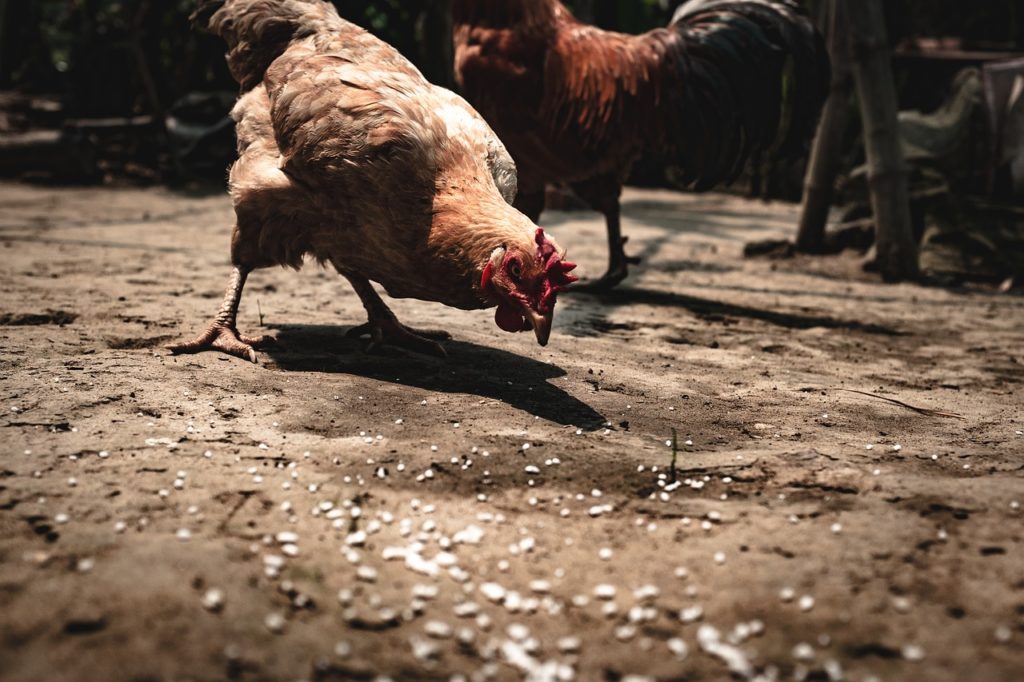
If there’s food nearby and one chicken finds it, you can be guaranteed that the rest of them will know about it, too.
A hen will call to her chicks when she finds food, and many breeds of roosters will do the same thing.
Regardless of the gender of the chicken, it will make a series of dull clicking noises, letting the other birds know that there is food nearby.
You may find that these noises are more common when your chickens have found a unique, tasty treat – like mealworms – as opposed to when they are simply eating out of their feeder.
This is because this noise is more closely associated with pleasure than it is with satisfying hunger.
[amazon box=”B01EUP8ZG6″]
8. Roosting Calls
Is it getting to be that time – bed time, that is?
If so, you may hear your chickens calling to each other as they prepare to roost.
Depending on the breed of chickens you have, you might even find that your roosters begin to emit succinct, loud calls as they encourage all of the hens to get inside the coop.
Some breeds of roosters will walk in circles around the coop repeatedly until all of his hens are safely inside.
Otherwise, a roosting call will sound similar among the sexes. It will be loud, low-pitched, and usually repetitive.
This occurs at nightfall and is an indication to the rest of your birds that it’s time to go to bed.
9. Mating Invitations
Most mating noises will be made on behalf of the rooster. These are usually low, deep, and rumbly.
You’ll likely hear these while the rooster is exhibiting other signs that he is ready to mate, like circling the hen and flicking his wings on the ground.
This sound indicates that a rooster is ready to mate with a hen – and yes, you might hear it several times in one day!
Hens, on the other hand, usually won’t make any noise during the courtship process.
Occasionally, they will emit sharp cries of surprise if a rooster approaches and they do not see him.
10. Distress Calls
There are several kinds of distress calls that a chicken might make.
Many of these are similar to those made by chickens who are alerting others to the presence of predators, but not always.
Distress calls can also be indicative of injury or illness. They are also often made by chickens who have become separated from the flock.
A startled squawk is a noise made by a chicken who has been pecked or injured. This is usually brief, sharp, and succinct.
It’s the chicken equivalent to us saying “ow!” when we stub our toes.
Another noise you might hear is a long, loud, high-pitched cry that is being emitted by a chicken who has been captured and is being moved away from the flock.
If you pick your chickens up and they are not accustomed to this – or if your chicken has been snatched by a predator – you can expect to hear this noise.
How Can I Get My Chickens to Be Quiet?
Most of the time, you should not try to get your chickens to be quiet.
Noisy chickens are biologically normal, and the reason why they make noise is so that they communicate to you (and to each other) that everything is okay – or if something is wrong.
However, if you live in an urban area – or are otherwise annoyed by the prospect of screaming chickens – there are some steps you can take to encourage a quieter flock.
Consider your Breed
Some breeds of chickens are quieter and less flighty than others.
When you are looking for a quieter chicken breed, consider one that is more docile and overall, more easygoing. Here are some good options:
- Australorps
- Buff Orpingtons
- Wyandottes
- Brahmas
- Barred Rocks
- Cochins
- Mottled Javas
- Speckled Sussex
- Rhode Island Reds
- Silkies
- Javas
On the flip side, some of the loudest chicken breeds you can raise include:
- Polish
- Welsummers
- Easter Eggers
- Araucana
Remember, however, that the noisiness of a chicken is largely determined by that bird’s individual personality – not, necessarily, it’s breed. Therefore, there is no guarantee that the breed you select will be quieter in all cases.
Stick to Hens Only
Roosters tend to make more noise than hens, which is why many cities and towns have restrictions placed on owning roosters – they either allow you to own either one or none at all.
Therefore, sticking to a hen-only flock can help cut down on some noise, but not all.
Consider Training Your Chickens
There are some backyard chicken keepers who will suggest training your chickens to be quiet. We recommend doing this with caution.
While you can train your birds to stop yelling by using a spray bottle filled with water, this is not recommended, particularly if you live in an area that is prone to predators.
Remember, chickens squawk, scream, and carry on because they are trying to alert each other – or you – to something that might be not quite right.
While some noises are nothing to be concerned about, you need to be careful about “noise-training” your chickens in most cases.
Is There Really Such Thing as a Quiet Chicken?
Yes, there is – but it’s not a healthy one.
Chickens make all kinds of noises, and while some breeds of chickens may be quieter than others, the reality is that they will all vocalize at one time or another.
While shy birds or those who are lower on the pecking order may not vocalize as much as more dominant birds, all birds will make some form of noise during the day.
Some birds are simply shy, but if your chickens are not talking at all, there might be something wrong.
Use the noises that your chickens make to guide you and inform you about your flock’s health and wellbeing. They can be a good sign of any illness, predator issues, or injury.
If you don’t believe that chickens can communicate, think again.
These unique birds have their own language, and while we may not understand it all the time, knowing the difference between the most common chicken noises is the easiest way to ensure our chickens’ health, happiness, and productivity in the long term.
